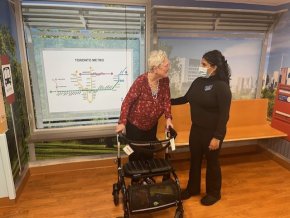Understand their needs and their story, and high-quality care follows | Specialized dementia care at Extendicare Rouge Valley
When you walk around the Behavioural Support Transitional Unit, or BSTU, at Extendicare Rouge Valley in Scarborough, Ontario, beautifully painted murals of nature landscapes and cityscapes mark the hallways.
Sensory boards offer sounds and textures. There are TTC bus stops that serve as resting places.
The artwork goes far beyond aesthetics. It is thoughtful, intentional, and helps to engineer the environment for residents with advanced Alzheimer’s and other forms of dementia.
“The visuals and design elements help make the unit feel less clinical and more like an interesting neighbourhood or small community,” says Karen Simpson, Manager of Behavioural Supports and Dementia Care expert at Extendicare.
“We want residents to feel safe, engaged, and comfortable. The murals can be calming, and visual cues help residents recognize where they are.”
Person-centered care and dementia
Today, dementia is one of the most common reasons a person enters long-term care.
Many people living with dementia develop needs that are difficult for families and caregivers to meet at home.
Care environments like the BSTU at Rouge Valley are specifically designed to care for residents with these complex behavioural needs and improve their quality of life.
In the unit, an interdisciplinary team of highly skilled health professionals, including a geriatric psychiatrist and geriatric mental health outreach clinician from Scarborough Health Network, registered nurses, a nurse practitioner, a social worker, personal support workers, activity aides, and a physician, work together in partnership with each resident’s family and caregivers.
The team sets out on a mission to learn about each resident’s story and their behavioural patterns, and develops tactics to support.
“High-quality dementia care is grounded in a commitment to understand each resident and their unique needs,” explains Extendicare’s Chief Medical Officer, Dr. Matthew Morgan.
“Learning more about who the resident is and what they did in their life before their dementia diagnosis can offer powerful insights to help provide the best care plan and make each person comfortable.”
In many cases, residents can feel calm when adopting familiar routines and enacting life chapters they recall from their own history.
The aim of the BSTU is to develop comprehensive and personalized care plans that incorporate their personhood, help alleviate responsive behaviours, and create a daily roadmap for quality of life.
"Person-centered care is really about finding ways to incorporate elements of what is important to residents into their care plan,” says Kelly Sawh, social worker in the BSTU, “That’s how we support residents and families in a tangible and meaningful way.”
